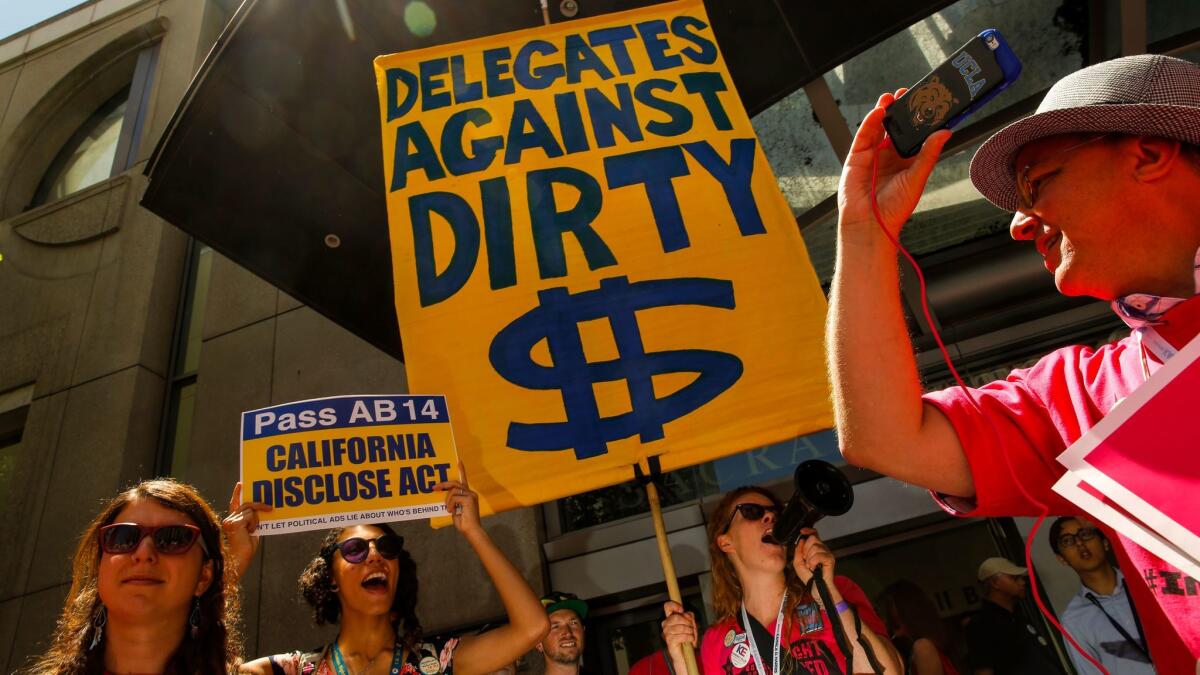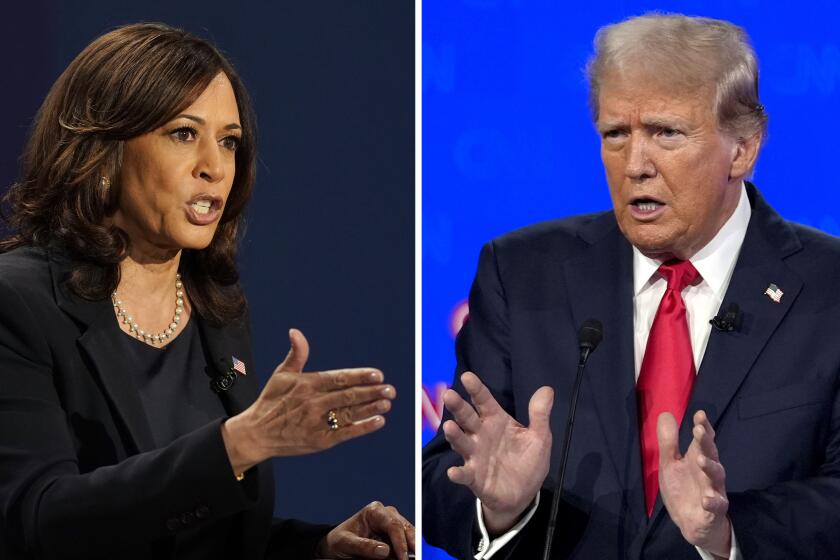Column: Political Road Map: Democrats not only dominate California elections, the party is king of campaign cash

Reporting from Sacramento ‚ÄĒ As California Democrats wrap up their weekend convention, progressive activists have said loudly and clearly that they want big money out of politics ‚ÄĒ a position that‚Äôs been in the state party‚Äôs official platform for years.
And yet, the rhetoric is at odds with reality: Since 2000, the California Democratic Party has spent an eye-popping $401.6 million on candidates and campaigns.
Delegates to the state party convention here wrote a resolution asking the party to ‚Äúcondemn corporations and lobbyists that finance political campaigns, as they perpetuate a culture of corruption and cronyism.‚ÄĚ But money from some of those same groups fueled more than $46 million in spending by Democrats on state and federal races last year.
That’s in stark contrast to the California Republican Party, which at one point in 2012 had less than $200,000 in the bank. In bank ledgers and at the ballot box, Democrats dominate. They haven’t lost a statewide election since 2006. They hold 41 of California’s 55 seats in Congress and a supermajority in both houses of the Legislature.
A review of campaign finance filings confirms the conventional wisdom that labor unions, representing private sector and government workers, contribute big bucks to Democrats. But so, too, do corporations. In 2016, more than $7.3 million in donations to the California Democratic Party’s main bank account came from utility, telecommunications and healthcare companies. That’s more than one-quarter of the cash received for spending on state campaigns.
Tribal gaming is also a big part of the money equation. Ten of California’s most prominent tribes accounted for $2.8 million collected by the party. Real estate interests threw in an additional $1.3 million. Big donations, too, have been accepted from law enforcement groups and insurance companies.
Political Road Map: California campaigns smashed cash records in 2016 ¬Ľ
Then there are donations from the oil industry. Late last year, state Democratic Party leaders imposed a ban on oil industry contributions. That decision came less than three months after a consumer advocacy group filed a state campaign finance complaint, alleging the party had quietly moved oil company cash into Gov. Jerry Brown‚Äôs 2014 reelection effort ‚ÄĒ though much of that complaint was dismissed last week.
Of course, the party’s ban came only after collecting some $575,000 from oil interests, including $415,000 from Chevron. The Bay Area company has contributed almost $1.4 million to the California Democratic Party over the past decade. Activists this weekend targeted oil industry dollars for special scorn.
All of that doesn’t include the millions of dollars raised by individual Democratic candidates in California, though perhaps it should. Many of those who win on election day later transfer money from their own campaign coffers back to the party.
On Saturday, Democrats protested outside the governor‚Äôs mansion in downtown Sacramento to demand an end to ‚Äúdirty money‚ÄĚ in politics. Many were supporters of Vermont Sen. Bernie Sanders, who has urged his followers to take a stand against the influence of big donations.
What happens next depends on the California Democratic Party‚Äôs new leaders who were elected this weekend ‚ÄĒ the first real changing of the guard in a generation. The 2018 election cycle has the potential to be huge for Democrats, a statewide referendum of sorts on President Trump. But Democrats may find it difficult to honor the call to change politics when faced with a campaign that demands dollars.
Follow @johnmyers on Twitter, sign up for our daily Essential Politics newsletter and listen to the weekly California Politics Podcast
ALSO:
Updates on California politics
More to Read
Get the L.A. Times Politics newsletter
Deeply reported insights into legislation, politics and policy from Sacramento, Washington and beyond. In your inbox three times per week.
You may occasionally receive promotional content from the Los Angeles Times.











